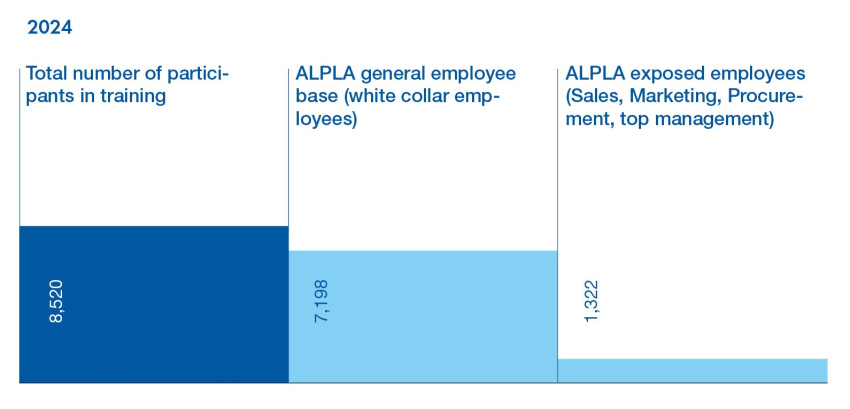- Sustainability Report 2023-2024
- Governance information
Policies, targets and actions
At ALPLA, upholding ethical standards is fundamental to our identity and corporate culture. Our approach to business conduct is intrinsically linked to our values and daily operations. Integrity, respect and accountability drive our decision-making processes, fostering an environment where employees feel valued, secure and empowered to excel. Here is how we achieve this:
- Following our Code of Conduct: our ALPLA Code of Conduct is more than a document – it represents our commitment. It establishes clear expectations for ethical behaviour and enables employees to make decisions with integrity and confidence.
- Leading by example: our leaders exemplify our values and principles consistently, embedding integrity and accountability into our organisational culture.
- Learning and awareness: we prioritise ongoing training and open discussions regarding ethics, compliance and responsible business practices, ensuring that ethical conduct becomes second nature. Internal stakeholders most exposed to business conduct risks (e.g. Sales, Procurement, Plant Engineering, Management) receive in-depth training while general training is mandatory for all employees.
- Encouraging open dialogue: we value every employee’s voice. Staff are encouraged to express their concerns and ask questions without fear of retaliation. Our whistle-blower practices safeguard the principle of integrity.
- Listening and improving: our commitment to culture is evidenced through regular surveys that solicit honest feedback from employees. This practice helps us identify strengths and areas for improvement, reinforcing that a robust culture is co-created by all members of the organisation.
- Sustainability and responsibility: ethical, social and environmental considerations are integral to our decision-making process, ensuring our contributions impact society and the environment positively.
At their core, our policies reflect our identity and the company we aspire to be by detailing some specific aspects also covered by our Code of Conduct. The following policies relate directly to business ethics:
- Our policy dedicated to anti-corruption, bribery and fraud prohibits all forms of corruption, bribery and fraud in connection with ALPLA’s business activities and outlines the preventive measures to take in this regard. The policy on business meals, meals, entertainment, catering and gifts supplements the aforementioned policy, detailing rules on how to proceed in cases of a conflict of interest.
- ALPLA’s policy on the ALPLA Reporting Channel (grievance mechanism) allows for flexible investigation procedures based on the specifics of each case.
- The policy on anticompetitive practices ensures compliance with antitrust laws and prohibits any practices that could restrict competition.
- The policy on sanctions screening mandates the screening of suppliers and business partners against international sanctions lists to ensure compliance with legal requirements.
- ALPLA’s policy on sustainable procurement promotes ethical standards and principles in procurement, focusing on reducing legal risks, minimising adverse human rights and environmental impacts.
Our business ethics target leaves no doubt about our commitment: ALPLA is aiming for zero confirmed reports of incidents related to corruption, conflict of interest, anti-competitive practices, fraud and money laundering each year until 2030.
The goal of compliance management is to prevent unlawful behaviour and, in doing so, avoid violations of the law. Apart from clear rules, guidelines and controls, this goal can be achieved through preventive measures such as communication and training. Internal blog posts and articles aim to sensitise employees, while mandatory training was introduced in 2024 for the general employee base (white collar employees) as well as in-depth training for exposed employees. The training is conducted annually and in an e-learning format currently.
In terms of detection, audits conducted by the Internal Audit department and the whistleblower system are currently the tool used. In the event of an incident, the Compliance and Internal Audit departments are primarily involved in addressing the case. These departments are independent of the chain of management. The Chairman of the Board is regularly informed by the Group General Counsel about the status and outcome of related investigations.
Metrics
Training
Corruption cases
During the reporting period, one incident of corruption was detected in each year; investigations and proceedings for the one that occurred in 2024 are ongoing. Internal measures were taken resulting in the dismissal of one individual in each case.



